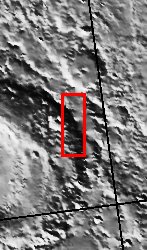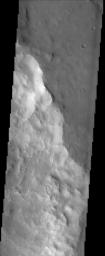Rim of Henry Crater
Caption:

(Released 02 April 2002)
This portion of the rim of Henry Crater has numerous dark streaks located on the slopes of the inner crater wall. These dark slope streaks have been suggested to have formed when the relatively bright dust that mantles the slopes slides downhill, either exposing a dust-free darker surface or creating a darker surface by increasing its roughness. The topography in this region appears muted, indicating the presence of regional dust mantling. The materials on floor of the crater (middle to lower left) are layered, with differing degrees of hardness and resistance to erosion producing cliffs (resistant layers) and ledges (easily eroded layers). These layered materials may have been originally deposited in water, although deposition by other means, such as windblown dust and sand, is also possible. Henry Crater, named after a 19th Century French astronomer, is 170 km in diameter and is located at 10.9° N, 336.7° W (23.3° E) in a region called Arabia Terra.
Cataloging Keywords:
| Name |
Value |
Additional Values |
| Target |
Mars |
|
| System |
|
|
| Target Type |
Planet |
|
| Mission |
2001 Mars Odyssey |
|
| Instrument Host |
Mars Odyssey |
|
| Host Type |
Orbiter |
|
| Instrument |
Thermal Emission Imaging System (THEMIS) |
|
| Detector |
|
|
| Extra Keywords |
Crater, Dust, Grayscale, Water |
| Acquisition Date |
|
| Release Date |
2002-05-21 |
| Date in Caption |
2002-04-02 |
|
| Image Credit |
NASA/JPL/Arizona State University |
| Source |
photojournal.jpl.nasa.gov/catalog/PIA03760 |
| Identifier |
PIA03760 |


